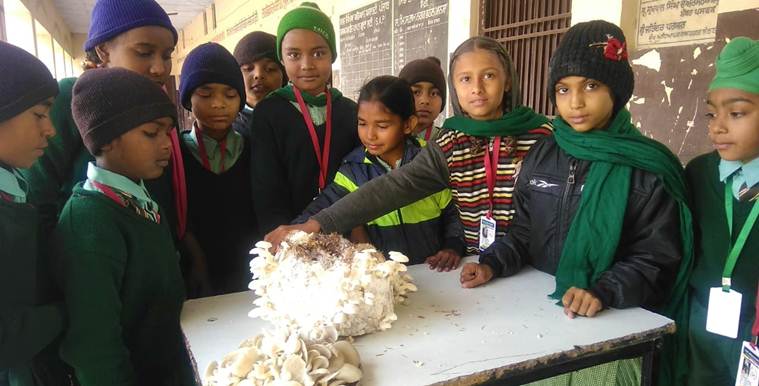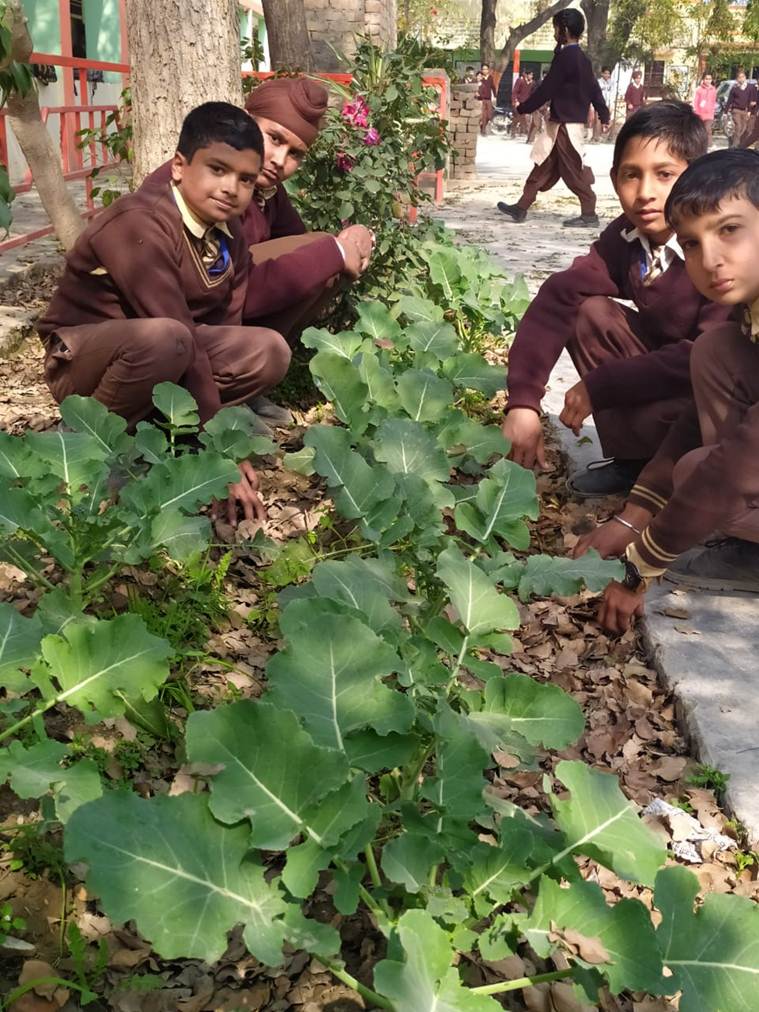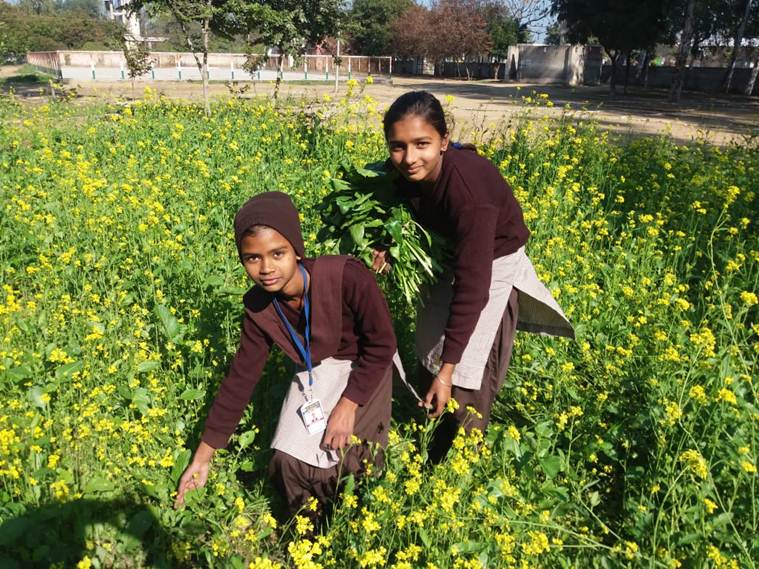FOR years, water-guzzling paddy and wheat have dominated the fields of Punjab, pushing groundwater levels down and spreading worry lines across farms. But now, one district is witnessing the first shoots of hope. Guided by experts from the state horticulture department, children in Mansa district are learning to grow their own organic, chemical-free vegetables in kitchen gardens at government schools.
The students are part of the ‘Edible Gardens’ programme started by the government in Budhlada block last August to help them stay connected with their roots. And these days, their mid-day meals include fresh vegetables — from spinach, lettuce, coriander, radish, spring onions and brinjals to sarson da saag (mustard greens) — that are grown by the children themselves.
It’s not just the “regular veggies”. The students have started growing oyster mushrooms and broccoli, too. They use green waste for composting and wheat and paddy straw, which their parents would otherwise burn in the fields, for mulching the gardens and growing oyster mushrooms.
 Students growing mushroom. (Express)
Students growing mushroom. (Express)
Officials and teachers say the kitchen gardens have become a part of their science practical sessions and will help the children develop skills that could firm up employment prospects.
“The results have been heartening,” says Vipesh Garg, Horticulture Development Officer (HDO), Budhlada, who is the lead initiator of the project. “Of the 87 villages in Budhlada, kitchen gardens have been established in at least 32, and more are being set up. We have trained at least 500 students to grow mushrooms using crop stubble,” he says.
“The purpose is not just to teach children to grow organic vegetables and make their mid-day meals nutritious but also to stop them from stubble-burning and divert their interest towards horticulture to break the wheat-paddy cycle,” says Garg.
At the government senior secondary school for boys in Boha, a garden has been set up using straw bales as chairs — the design won the first prize under ‘Sustainable Agricultural Practices’ at the district science competition.
 The students are part of the ‘Edible Gardens’ programme started by the government in Budhlada block last August to help them stay connected with their roots. (Express)
The students are part of the ‘Edible Gardens’ programme started by the government in Budhlada block last August to help them stay connected with their roots. (Express)
Parmal Singh, the school principal, says around 100 students from Class 9-12 grow mushrooms, garlic, coriander and onions. “The students are also being taught mushroom processing, which will help them prepare for the National Skills Qualification Framework.” The NSQF facilitates certification for skills competency through formal, non-formal or informal learning.
Jagdeep Kaur, a teacher from the government middle school in Chak Bhai Ke, says students from Class 6-8 “enjoy working in the kitchen garden”.
“Whenever the kids feel stressed or bored, they tell teachers to take them to the garden. They grow spinach, lettuce, coriander, radish and onions using manure prepared after composting,” she says.
Naveen Kumar, the project’s coordinator at the government middle school in Ram Nagar Bhatal, says they are also setting up a garden for medicinal and herbal plants. “Other schools have started asking for fresh vegetables from our garden,” he says.
 Students growing brocolli. (Express)
Students growing brocolli. (Express)
At the government senior secondary school in Budhlada, Class 11-12 students have grown oyster mushrooms using stubble. “It also helps them in their biology practicals. They are easy to grow and we use them in our mid-day meals. Most of the students are from low-income families and they can pursue mushroom cultivation for better income after schooling,” says Jasbir Singh, a biology teacher.
According to the latest assessment of the Central Ground Water Board (CGWB), Budhlada is among five blocks in Mansa that fall in the “over-exploited” category. This is the most severe category, which means groundwater extraction is more than net availability with a significant long-term decline in levels. The 2017 report also notes that the groundwater quality is “alkaline, brackish and not fit for irrigation”.
“These are big issues in Mansa and we have to catch students young to make them aware. We are suggesting garden designs that use less water, and encourage the use of paddy and wheat straw,” says Garg, the HDO.
 Students working in their kitchen gardens at different government schools in Budhlada of Mansa. (Express)
Students working in their kitchen gardens at different government schools in Budhlada of Mansa. (Express)
The official, however, acknowledges that the programme, which is being promoted under Punjab Tandrust Mission, is facing challenges on the ground. “There is a lack of trained and motivated staff in the Horticulture Department to regularly visit schools. We try to provide mushroom seeds (spawns) free of cost, but lack of funding is an issue,” he says.
Yet, senior district officials are happy with the results so far. “In Mansa, groundwater levels are depleting, wheat-paddy still dominates fields and chemicals are used incessantly. We thought a change could start with young farmers and their organic kitchen gardens in schools. Besides, kids in Punjab hardly stay connected to agriculture these days. They just want to go abroad. This is an effort to connect them again to their roots,” says Gurmeet Singh Sidhu, Additional Deputy Commissioner, Mansa.